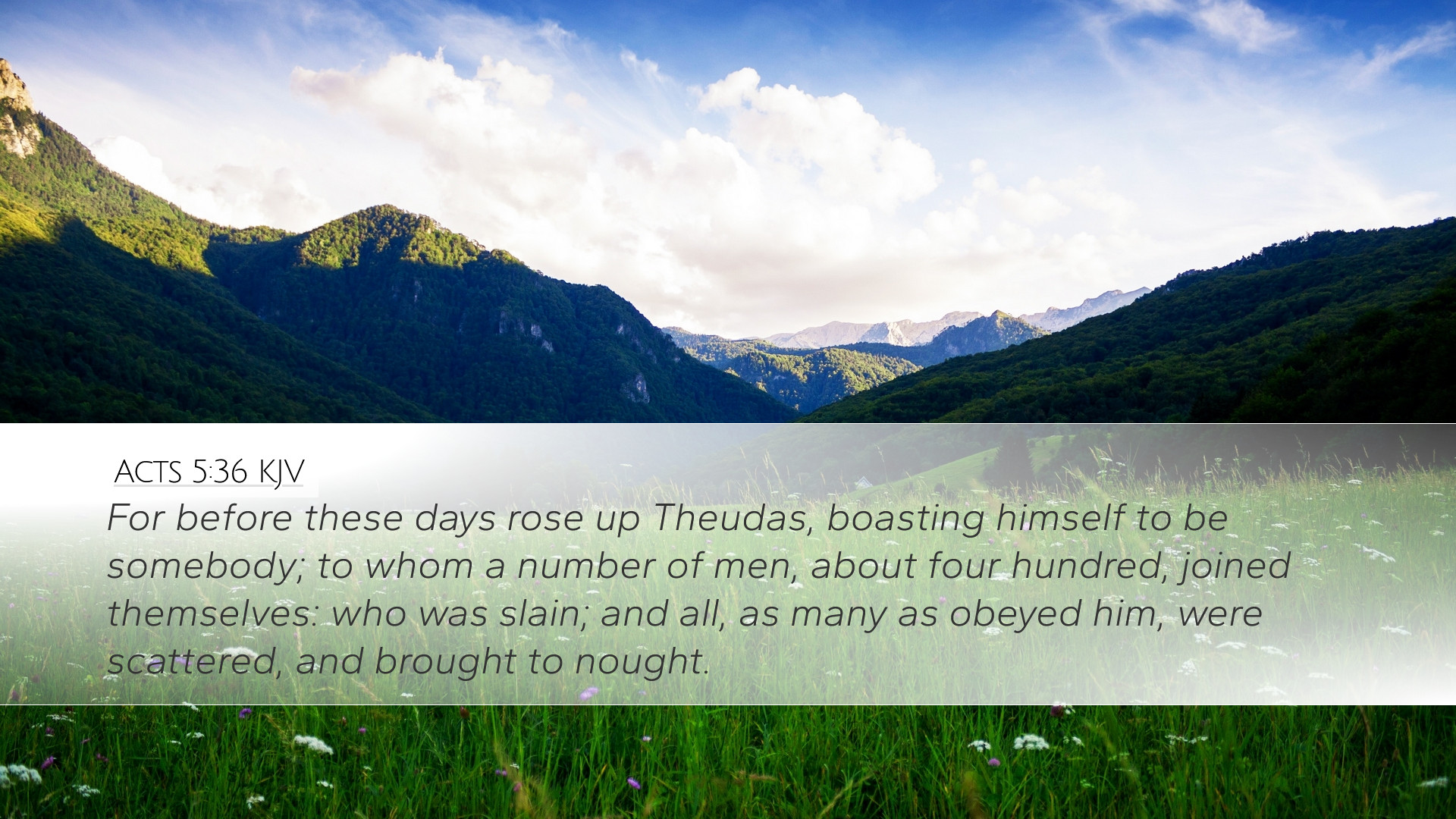Commentary on Acts 5:36
Acts 5:36 states, "For before these days rose up Theudas, boasting himself to be somebody; to whom a number of men, about four hundred, joined themselves: who was slain; and all, as many as obeyed him, were scattered, and brought to nought." This verse provides significant insight into the early context of the Christian movement and the nature of leadership and followership. Below, we summarize the contributions from prominent public domain commentaries.
Contextual Background
The context of this verse unfolds during a critical period in Jerusalem's history, following the outpouring of the Holy Spirit and the eruption of Christian persecution. The apostles’ preaching led to both widespread acclaim and severe opposition. The mention of Theudas serves as a cautionary historical example of misguided leadership.
Insights from Matthew Henry
Matthew Henry offers a perspective focused on the nature of false prophets and the repercussions of rebellion against established authority:
- Misleading Leadership: Theudas is portrayed as a self-proclaimed leader who led many astray. His rise and fall serve as a warning that not every leader who claims authority is called by God.
- The Nature of God’s People: Henry emphasizes that true followers of Christ should be aware of the distinction between divine leadership and human ambition. He contrasts the temporary success of Theudas with the eternal kingdom established by Christ.
- Divine Judgment: Henry notes that Theudas' demise reflects God’s judgment on those who rise against His chosen ones, highlighting that God ultimately protects His church from falsehood.
Insights from Albert Barnes
Albert Barnes offers a more analytical interpretation, focusing on the historical and social implications of Theudas’ movement:
- Historical Significance: Barnes discusses how Theudas fits into the broader narrative of Jewish history and how his following exemplified the restlessness of the times.
- Nature of Revolt: He points out that the followers of Theudas showed the susceptibility of people to false messiahs. Barnes urges that the nature of rebellion can deceive many during periods of social unrest.
- Comparison with Christ: In the broad narrative of Acts, Barnes argues that the positioning of Theudas and his followers serves to highlight the authentic nature of Christ's messianic claim, which is validated through resurrection and the work of the apostles.
Insights from Adam Clarke
Adam Clarke approaches the text with a focus on textual criticism and exegetical analysis:
- Textual Integrity: Clarke addresses the variations in historical accounts of Theudas, noting the importance of textual integrity when assessing the motives and actions of historical figures.
- Spiritual Lessons: Clarke encourages readers to draw spiritual lessons from Theudas' failure, emphasizing the need for humility and the recognition of God’s authority over human endeavors.
- The Perils of Pride: He discusses the dangers of pride exemplified in Theudas, suggesting that personal ambition can lead individuals away from the truth, ultimately resulting in destruction.
Theological Implications
The commentary on Acts 5:36 draws several important theological implications for pastors, students, and theologians:
- Beware of False Prophets: The legacy of Theudas illustrates the necessity for discernment in evaluating leaders and movements within the church.
- The Sovereignty of God: The verse reinforces the theme of God’s sovereignty—He determines the rise and fall of leaders, and He will not allow His true gospel to be overthrown by falsehood.
- Call for True Discipleship: True discipleship requires alignment with Christ, not charisma or popularity. This example serves as a critical reminder for followers to examine the source and substance of their leaders.
Conclusion
Acts 5:36 serves as a poignant reminder of the dynamics of leadership within the context of faith communities. By drawing from the insights of Henry, Barnes, and Clarke, we gain a richer understanding of how early Christians navigated the challenges imposed by false leaders. This verse encourages present-day believers to root their faith in the authenticity of God's calling and the divine authority that stands in contrast to human ambition.


